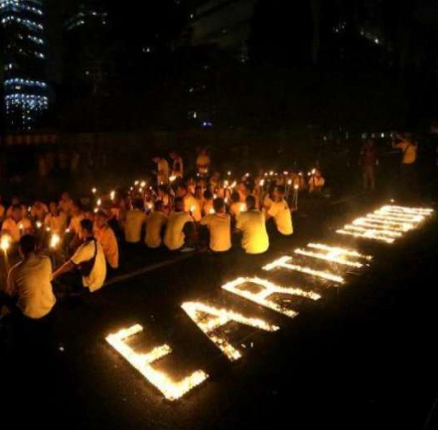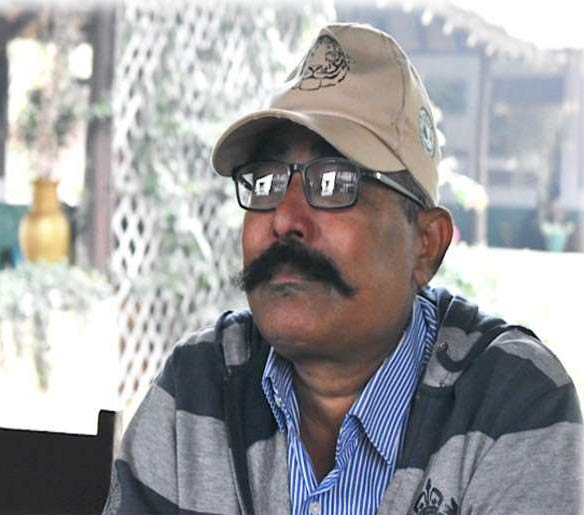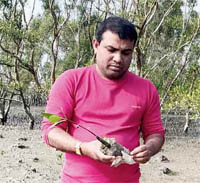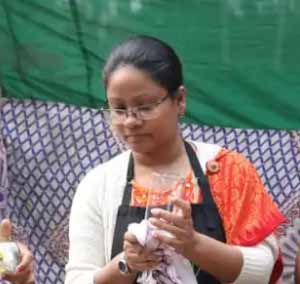
Environment Hero: ये है पीलीभीत के 'बाघ मित्र' विपिन की कहानी
पीलीभीत के माजरापट्टी गांव में रहने वाले विपिन कुमार बाघ मित्र के नाम से जाने जाते हैं। वह बताते हैं कि गांव में उनका बाघ से आमना-सामना कई बार हुआ था लेकिन वह उस दौरान डरे नहीं। उन्हें बाघ बहुत आकर्षित करते हैं।
Read more

माइक्रोग्रिड बना कर गांव वालों ने पूरी की अपनी बिजली की जरूरत, जानिए क्या है माडल
आज जरूरत ऐसे छोटे-छोटे प्रयासों से पर्यावरण की रक्षा करने से है जिनका लंबे समय बाद बड़ा प्रभाव नजर आए। ऐसा ही एक छोटा-सा प्रयास पश्चिम बंगाल के सुंदरबन का एक गांव लाहिरीपुर में हुआ है। ये गांव अब खुद अपनी बिजली की आवश्यकता को पूरा कर रहा है।
Read more

अर्थ आवर एक प्रभावशाली प्रयास, जो कहता है बदलते पर्यावरण की कहानी: शांतनु मोइत्रा
किसी भी बड़े काम की शुरुआत छोटे स्तर से ही होती है। अर्थ आवर भी एक छोटा-सा प्रयास हमारे पर्यावरण को बचाने के लिए है जिसका बड़ा प्रभाव हमें भविष्य में जरूर नजर आएगा। ऐसा कहना है प्रसिद्ध संगीतकार और डब्लूडब्लूएफ इंडिया के होप एंड हॉर्मनी एंबेसडर शांतनु मोइत्रा का।
Read more

Environment Hero: स्टूडेंट्स ने 400 रुपये में बनाया देसी फ्रिज, किसानों की बढ़ाएगा आय
कहा जाता है कि आवश्यकता ही आविष्कार की जननी होती है। सब्जियों को सुरक्षित रखने की किसानों की आवश्यकता को ध्यान में रखकर कुछ छात्रों ने एक ऐसे फ्रीज का आविष्कार किया है जो बिना बिजली के काम करता है।
Read more

सोलह वर्षों के बाद भी अर्थ आवर महत्वपूर्ण क्यों है?
यदि आप सोचते हों कि एक घंटे तक बत्तियां बंद करने से जलवायु परिवर्तन में वास्तव में कोई फर्क नहीं पड़ने वाला, तो फिर आज सोलह वर्षों के बाद भी विश्व ऐसा क्यों कर रहा है?
Read more

कछुओं के संरक्षण से साफ रहो रही गंगा, डब्लूडब्लूएफ के साथ मिलकर नीरज और रंजीत ने की बड़ी शुरुआत
कहते हैं कि छोटे-छोटे प्रयास, बड़े बदलाव लाने की ताकत रखते हैं। इसी की मिसाल है हस्तिनापुर के पास रामगंगा। यहां नदियों को साफ करने के लिए प्राकृतिक तरीके का इस्तेमाल किया गया
Read more

जानिए कौन है अतुल सिंह जिन्हें कहा जाता है पीलीभीत का बाघ पुरुष
Pilibhit Tiger Man Atul Singh अतुल सिंह को जब भी पीलीभीत बाघ अभयारण्य के निकट किसी गांव के पास किसी बाघ के भटक जाने का समाचार मिलता है तो उनकी आंखों में हमेशा एक रोमांच जाग उठता है।एक बार उन्होंने तीन दिनों तक एक बाघ का पीछा किया था।
Read more

Mangrove planting brings award to teacher in Sunderbans
Umashankar Mondal, 40, had earned the moniker of “mangrove man” among residents of the Sunderbans a long time ago for his unrelenting seedling planting work towards the sustenance and rejuvenation of the mangroves.
Read more

Meet the defenders of the Himalaya
"It was like seeing a white ghost,” Chyangba Bhutia says, in broken Hindi, over the phone from Gangtok. “It was right there, in the flesh... 50m away from me.”
Read more

How Mitali Dutta is giving hope and livelihood to women in rural Assam
While the United Nations’ global focus for the year is gender equality, there is need to pay close attention to women in rural communities and how they can become more meaningful to themselves, their families and the society at large.
Read more
